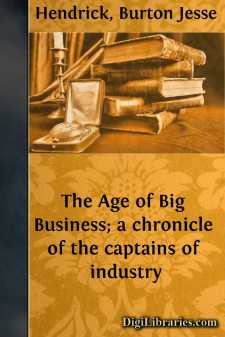Categories
- Antiques & Collectibles 13
- Architecture 36
- Art 48
- Bibles 22
- Biography & Autobiography 813
- Body, Mind & Spirit 142
- Business & Economics 28
- Children's Books 17
- Children's Fiction 14
- Computers 4
- Cooking 94
- Crafts & Hobbies 4
- Drama 346
- Education 46
- Family & Relationships 57
- Fiction 11829
- Games 19
- Gardening 17
- Health & Fitness 34
- History 1377
- House & Home 1
- Humor 147
- Juvenile Fiction 1873
- Juvenile Nonfiction 202
- Language Arts & Disciplines 88
- Law 16
- Literary Collections 686
- Literary Criticism 179
- Mathematics 13
- Medical 41
- Music 40
- Nature 179
- Non-Classifiable 1768
- Performing Arts 7
- Periodicals 1453
- Philosophy 64
- Photography 2
- Poetry 896
- Political Science 203
- Psychology 42
- Reference 154
- Religion 513
- Science 126
- Self-Help 84
- Social Science 81
- Sports & Recreation 34
- Study Aids 3
- Technology & Engineering 59
- Transportation 23
- Travel 463
- True Crime 29
Burton Jesse Hendrick
Burton Jesse Hendrick (1870–1949) was an American biographer and journalist, best known for his historical works. He won the Pulitzer Prize three times, including for his biographies "The Life and Letters of Walter H. Page" and "The Training of an American: The Earlier Life and Letters of Walter H. Page." Hendrick specialized in writing about prominent figures in American politics and diplomacy, often blending biography with history. His works are characterized by their detailed research and engaging narrative style.
Author's Books:
Sort by:
CHAPTER XIV THE "LUSITANIA"—AND AFTER The news of the Lusitania was received at the American Embassy at four o'clock on the afternoon of May 7, 1915. At that time preparations were under way for a dinner in honour of Colonel and Mrs. House; the first Lusitania announcement declared that only the ship itself had been destroyed and that all the passengers and members of the crew had been...
more...
CHAPTER I A RECONSTRUCTION BOYHOOD The earliest recollections of any man have great biographical interest, and this is especially the case with Walter Page, for not the least dramatic aspect of his life was that it spanned the two greatest wars in history. Page spent his last weeks in England, at Sandwich, on the coast of Kent; every day and every night he could hear the pounding of the great guns in...
more...
CHAPTER I. INDUSTRIAL AMERICA AT THE END OF THE CIVIL WAR A comprehensive survey of the United States, at the end of the Civil War, would reveal a state of society which bears little resemblance to that of today. Almost all those commonplace fundamentals of existence, the things that contribute to our bodily comfort while they vex us with economic and political problems, had not yet made their...
more...




